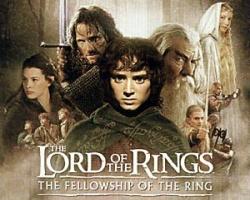"Stop possessing it," instructs Gandalf the Grey to Bilbo Baggins as they first discuss the ring that animates one of the most significant literary works of the 20th century: J.R.R. Tolkien's The Lord of the Rings (LOTR).
While it's true that Tolkien's world (or interpretations of it) have engaged the public's imagination since initial publication in 1954 and 1955 through animation, video games and a hugely popular blockbuster film series, these creative responses are no more definitive or final in their representations of Tolkien's witness than is a single production of a Shakespeare play. Friends don't let friends see the LOTR films without reading the source material. The lyrical authority and the comprehensive scope of Tolkien's vision are gifts that keep on giving.
In the first book of the trilogy (The Fellowship of the Ring), Gandalf counsels Bilbo that the ring of great power, which Bilbo possesses, may in fact possess him. "It has…far too much hold on you. Let it go!" This is years before the Council of Elrond, the reappearance of Sme´agol, and the siege of Gondor; but in microcosm, this exchange is at the heart of Tolkien's moral vision. After flipping out for a moment, indulging in harried equivocation and referring to the thing as his "precious," Bilbo surrenders the ring, following the gesture with a tired look of relief and a laugh.
In typical Tolkien fashion, Gandalf describes the scene of Bilbo's struggle to Frodo years later ("He hated it and loved it, as he hated and loved himself.") and does so in such an offhanded way that the cosmic significance of the moment only dawns upon the reader gradually. Of all the beings in the ring's history, it is only Bilbo, Gandalf observes, who gave it up willingly.
That which Hobbits such as Bilbo, Frodo and Frodo's friend Samwise Gamgee seem to perform almost unknowingly is the work Gandalf himself seeks to emulate—the creative capacity for open-handedness. This is not unrelated to the habit of self-emptying (kenosis) whereby Jesus, according to
There's the issue of Gollum (formerly called Sme´agol), for instance, which the various members of the Fellowship of the Ring (Frodo, Aragorn, et al) have to sort through. Would it not make a certain sense to put the poor creature out of his misery? Apart from the terror he doubtless will bring, he also had murdered his relative Deagol first to obtain the ring, so a quick death might be better than he deserves. Gandalf will have none of it:
"Many [who] live deserve death…Some [who] die deserve life. Can you give it to them?..Do not be too eager to deal out death in judgment. For even the wise cannot see all ends." As a steward, not a ruler, of all that might yet flower and bloom, Gandalf is committed to a deeply redemptive attentiveness to the world as it is; not as it might be remade: "I have not much hope that Gollum can be cured before he dies, but there is a chance…the pity of Bilbo may rule the fate of many." Even when he has the opportunity to take out his wizard rival, Saruman, Gandalf refrains: "I do not wish for mastery."
In fiction, scholarship and correspondence, Tolkien often appears to be our most eloquent and prophetic critic of the well-intentioned but tragically misguided will to domination, the tale that in a 1951 letter to his editor he termed, "the Fall, Mortality and the Machine." The desire to move beyond "the satisfactions of plain ordinary biological life" leads to the "bulldozing" of humans and other living things.
Such desire dedicates itself to presumed efficiency and paved-over meadows people on committees once referred to as "development." As Tolkien teaches us, the more knowingly incarnate work of redemptive cultivation is an artfulness that always eschews such mastery. As with the magic practiced by the most faithful denizens of Middle-earth, "Its object is Art not Power, sub-creation not domination and tyrannous reforming of creation."




